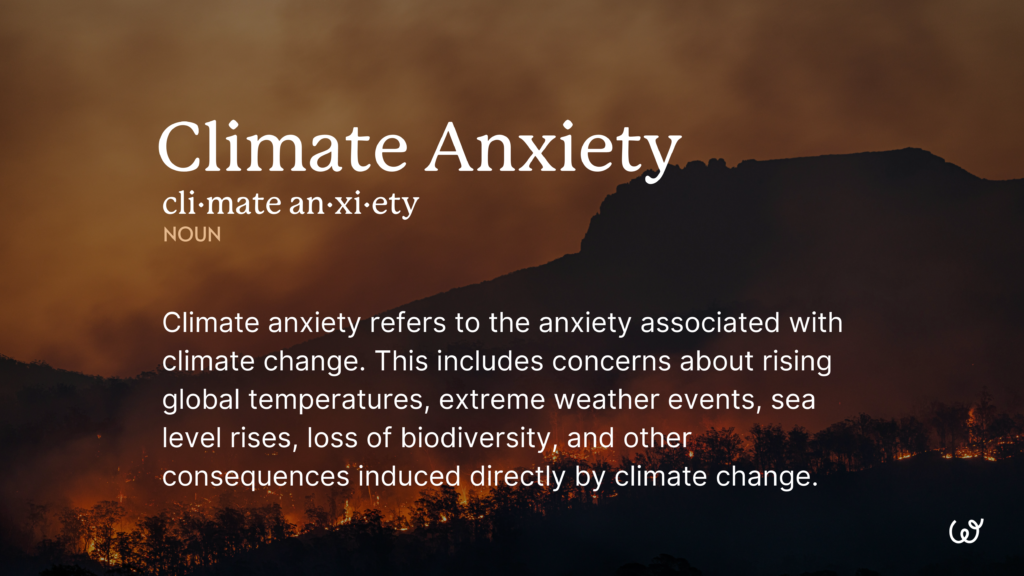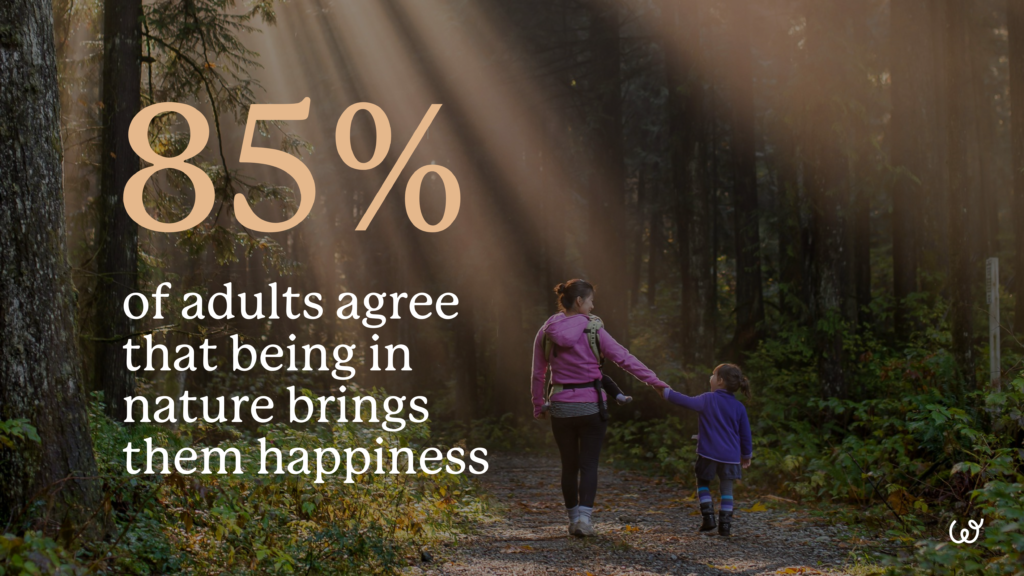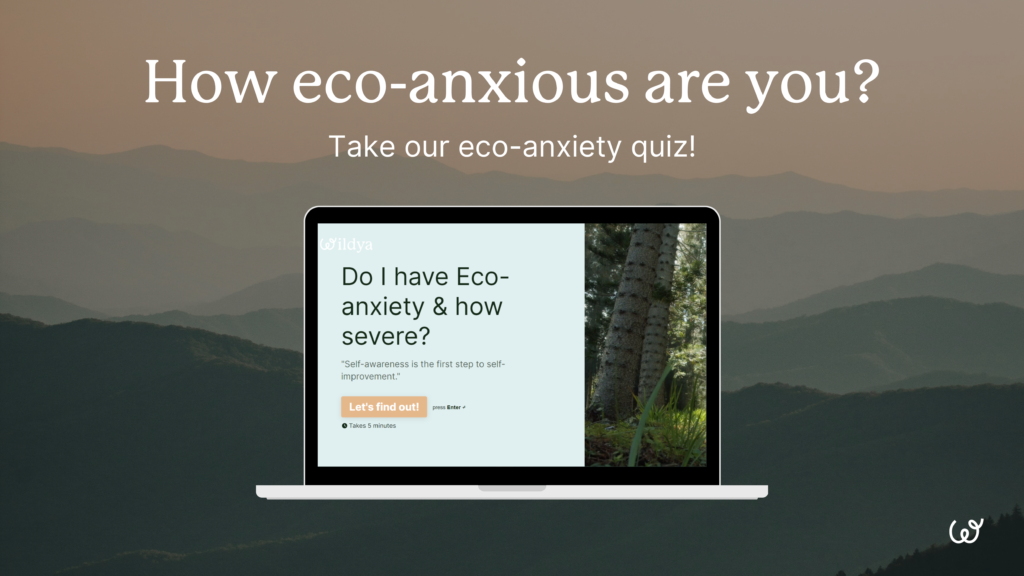Globally, the awareness of mental health, AND climate change, is rising; yet many of us still don’t know how to deal with climate anxiety.
You may have read an article that teaches you to recognise the signs it is impacting your daily life. Or perhaps you have watched a video that explains various symptoms of eco-anxiety like eco-shame, or eco-guilt. But have you noticed that when we decide it’s time to channel our frustration, born from climate anxiety, into action, we are given nada?
Taking care of your mental health is already hard. Climate anxiety now makes it even HARDER because climate change is driven by not just your own actions, but society as a whole.
But what if we told you that you’re looking in all the wrong places… Are you eco-anxious and seeking ways to feel better? We feel you. Here are our top tips to recognise the benefits of nature and its superpower that supports your mental fitness.
What is climate anxiety and how does it affect us?

Quick definition about climate anxiety
So, you’re familiar with anxiety. What about climate anxiety? Climate anxiety, also referred to as eco-anxiety, refers to the psychological distress or emotional response caused by the perceived or real effects of climate change.
With climate change on the rise, we’re seeing a surge in extreme weather events like floods, storms, droughts, and wildfires. It’s like Mother Nature is throwing a wild party, but none of us are having fun!
The difference between climate anxiety and eco-anxiety
Despite each phrase often used to compliment one another, discrepancies exist when using them interchangeably. Yes, really! Here’s the breakdown:
According to a recent study, climate anxiety refers to the anxiety associated with climate change. This includes concerns about rising global temperatures, extreme weather events, sea level rises, and other consequences induced directly by climate change.
Eco-anxiety is a broader term encompassing a wider range of environmental concerns beyond just climate change. It includes anxiety related to various ecological degradation issues such as deforestation, pollution, loss of habitat, species extinction, and plastic pollution.
A few of the latest statistics about climate and eco-anxiety
Unfortunately, climate anxiety has the power to cause global damage because climate change is universal, and pretty unpredictable. How exactly is this taking its toll on us?
- 67% of Gen Z are anxious about climate change
- 45% of people say eco-anxiety somehow affects their daily lives
- 56% believe that climate change will have a bigger impact on humanity than Coronavirus
- 75% of people in Great Britain worry about climate change
Not convinced? Dive deep into the wild data in our latest study that evidences climate changes’ effect on us globally.

How to know if you suffer from climate or eco-anxiety?
The symptoms of eco-anxiety
Navigating eco-anxiety symptoms is challenging, especially with limited research in the mental health realm. But fear not! In our latest article, we’ve got you covered. We dive into the top 11 eco-anxiety symptoms (sneak peek below), debunk your fears, and offer actionable tips to soothe stress caused by climate change.
- Lack of focus
- Demotivation
- Chronic worry
- Sleeping disorders
- Feelings of helplessness
- Eco-grief
- Eco-guilt
- Depression
- Isolation
- Panic attacks
- Anger
The Wildya eco-anxiety quiz
How do you feel when you see raging wildfires or the loss of animal habitats due to climate change? Does it motivate you to act or leave you feeling down? Do you sometimes avoid this type of content to ease stress and fear?
Mental health often carries a stigma, making it hard to discuss openly. Plus, caring for our mental well-being can be costly, adding another hurdle to the already challenging battle many of us are facing.
Our free eco-anxiety quiz offers a private and convenient way to start your self-reflection journey anytime. Unlike traditional tests, it’s quick, interactive, and user-friendly. Discover more about yourself without breaking a sweat!
How to deal with climate anxiety?
Take action
As natural disasters become more turbulent, climate anxiety often leaves people struggling to navigate the tangled web of emotions and symptoms caused by climate change.
Engaging in eco-friendly endeavors isn’t just about saving the planet – it’s the key to alleviating feelings of guilt and frustration associated with climate anxiety too. But what can taking action look like?
Buying in bulk to reduce transport emissions, or using only cold water when doing your laundry to lower your carbon footprint (and save on your gas bill) are a great start! By being a part of nature-nurturing initiatives, you not only contribute positively to the environment but also nurture your own mental health along the way. It’s a win-win!
Look at for help and support
Don’t hesitate to branch out and connect with fellow eco-anxiety warriors! Sharing your struggles with those who truly empathise, can provide a comforting sense of solidarity from eco-anxiety symptoms. Whether this be professionally, or off the record – confiding your eco-anxiety provoked feelings with someone will relieve some of the unwarranted stressors from your mind.
At Wildya, our goal is to empower you to turn eco-anxiety into meaningful action. That’s why we established Eco-Allies – a global community where individuals struggling with eco-anxiety can find solace and inspiration for positive climate action. What are you waiting for? Join us!
Spend more time outside and enjoy the benefit of nature on mental health
It’s no secret that nature plays a crucial role in improving your mental fitness. Find this hard to believe? 85% of adults agree that being in nature brings them happiness, and 91% of adults said that natural spaces have a positive impact on mental health and well-being. It really is food for your soul!
If you’re someone who even struggles to commit to a walk around the block – challenge your mind to put a creative twist on a nature-loving activity that engages, and soothes your mind. Have a love for arts and crafts? Challenge yourself to draw or paint using only items found on a walk round your local park.
But don’t stop there! If you love cooking, you could head out on an edible foraging hunt and observe the flowers, animals, and wildlife you encounter along the way.
Limit negative content about climate change
When we spend so much of our day online, it’s hard to stay away from negative news about climate change. Even our drive to work is interrupted by the radio’s daily news bulletin – we can’t catch a break!
What does taking a break from climate change look like?
- Spending your day off practicing self-care. Bonus points if it’s spent in nature!
- Engage with nature, rather than contending it – start a new nature-based hobby!
- Spending time with your loved ones (and putting boundaries in place to void conversations about climate change).
- Muting social media accounts that share updates on climate change. Instead, follow social media accounts that share news of projects that are driving positive change!
- Calling it quits with the news!
How to transform your climate anxiety into action?

Find your purpose.
It’s essential to find the right balance when diving into climate projects or advocating for causes. Taking on too much can easily lead to burnout. So, why not streamline your focus and channel your energy into projects and issues that truly resonate with you?
For example, you could decide to channel your love of fashion into championing a second-hand only lifestyle. Encouraging people to thrift when buying, or promoting online selling platforms, like ebay or vinted, to make some extra dosh too! By honing in on a select few issues, you can effectively manage stress levels, find a better balance, and keep your enthusiasm alive! It’s all about finding your niche and making a meaningful impact without spreading yourself too thin.
Join a local community
Joining a local community can seem daunting at first, we get it. However, when you imagine a guided nature walk or outdoor foraging workshop, is the thought as scary? They provide opportunities to forge connections not only with nature but also like-minded individuals.
Take our eco-allies community, for instance – it’s a prime example of a movement that warmly welcomes individuals grappling with eco-anxiety to find support. They are able to deepen their understanding of the climate, and take meaningful action alongside others who share their passion for nature.
Volunteer for environmental projects
Contrary to popular belief, volunteering projects aren’t restrictive to your local litter pick or beach clean up. If you prefer something more hands on, community gardening projects offer a chance to invest in green spaces whilst promoting sustainable food practices.
For wildlife enthusiasts, habitat restoration projects provide the opportunity to restore native ecosystems and support indigenous communities. And if education is your forte, consider volunteering for environmental education programs to inspire the next generation of eco-warriors.
Don’t know where to start? We’ve got your back! Sign up to our newsletter to explore a range of environmental volunteer, and paid work, opportunities that we share weekly.
Integrate more sustainable practices in your life little by little
Addressing climate change is no small feat—it’s a challenge that requires collective effort. While this reality may seem daunting, it serves as a gentle nudge to concentrate on what you can personally influence rather than dwelling on what you cannot.
Ways to focus on actionable steps within your control:
- Participating in climate activism by writing to legislators, encouraging them to take action.
- Participate in nature-based learning activities to not only connect deeper with nature, but yourself too. Discover our favourite nature-based learning activities in our recent blog!
- Incorporating sustainable habits that are mindful of energy use, waste, and consumerism.
- Choosing sustainable food options that reduce environmental impact (e.g. factoring plant-based meals into your diet, or starting your own veg patch!)
- Donating to environmental causes you care about. Give back to nature, and a loved one, by gifting coral with The Coral Gardeners!
Spread the word around you in a respectful manner
When it comes to fostering eco-friendly behaviors, sharing knowledge and ideas is the winning approach, believe us! Engaging in friendly and supportive discussions about environmental topics creates a fertile ground for inspiration to blossom. It motivates others to collaborate on solutions and unite in making a real, tangible difference.
The psychological impact of climate change can manifest itself in the form of eco-shame. It includes highlighting an individual’s environmental inactivity, or lack of personal eco-awareness. You heard it here first – don’t be this person!
Why not kick-start the conversation by joining an existing community, or starting your own? Our Eco-Allies community is buzzing with nature-centric chats that go beyond just sharing knowledge; it’s all about igniting the drive to take meaningful action.
Transform eco-anxiety into action with the Wildya app
We humans are storytellers. Historically, we have spent a lot more time around bonfires than computers. Stories are the most powerful way to remember; and so in our case, storytelling is done by taking inspiration from nature.
Nature has plenty of stories to tell, and the visual characteristics of nature will help many to remember the theoretical concepts we present through the Wildya app.
Start by investing a small amount of time each day through nature-based learning and create a big impact. It’s simple: instead of theory, we focus on action. We provide you with courses that tackle all of these symptoms and daily actions to ensure you take your life back.
In the vast wilderness of climate anxiety, finding a sense of control can seem as elusive as a rare species. Yet, amidst this atmospheric chaos, there is hope: taking action.
It’s important to understand that taking action, no matter how small, can empower you and bring a sense of control. Just as branches intertwine to strengthen against the wind, joining forces with like-minded individuals will amplify your impact, and relieve symptoms of climate anxiety.
Now you are learning how to deal with climate anxiety, and understand the benefits of nature, you’ll know that coping with climate anxiety isn’t a sprint, but rather a marathon! Remember: engage in conversations with others, collaborate, and adopt sustainable lifestyle choices that reflect your personal values.
Sources:
- If climate change keeps you up at night, here’s how to cope, Harvard.
- Eco-anxiety: how to cope at a time of climate crisis, Natural History Museum.
- 6 tips for coping with climate anxiety, University of Colorado.
- Understanding Eco-anxiety: A Systematic Scoping Review of Current Literature and Identified Knowledge Gaps – ScienceDirect, Science Direct.


